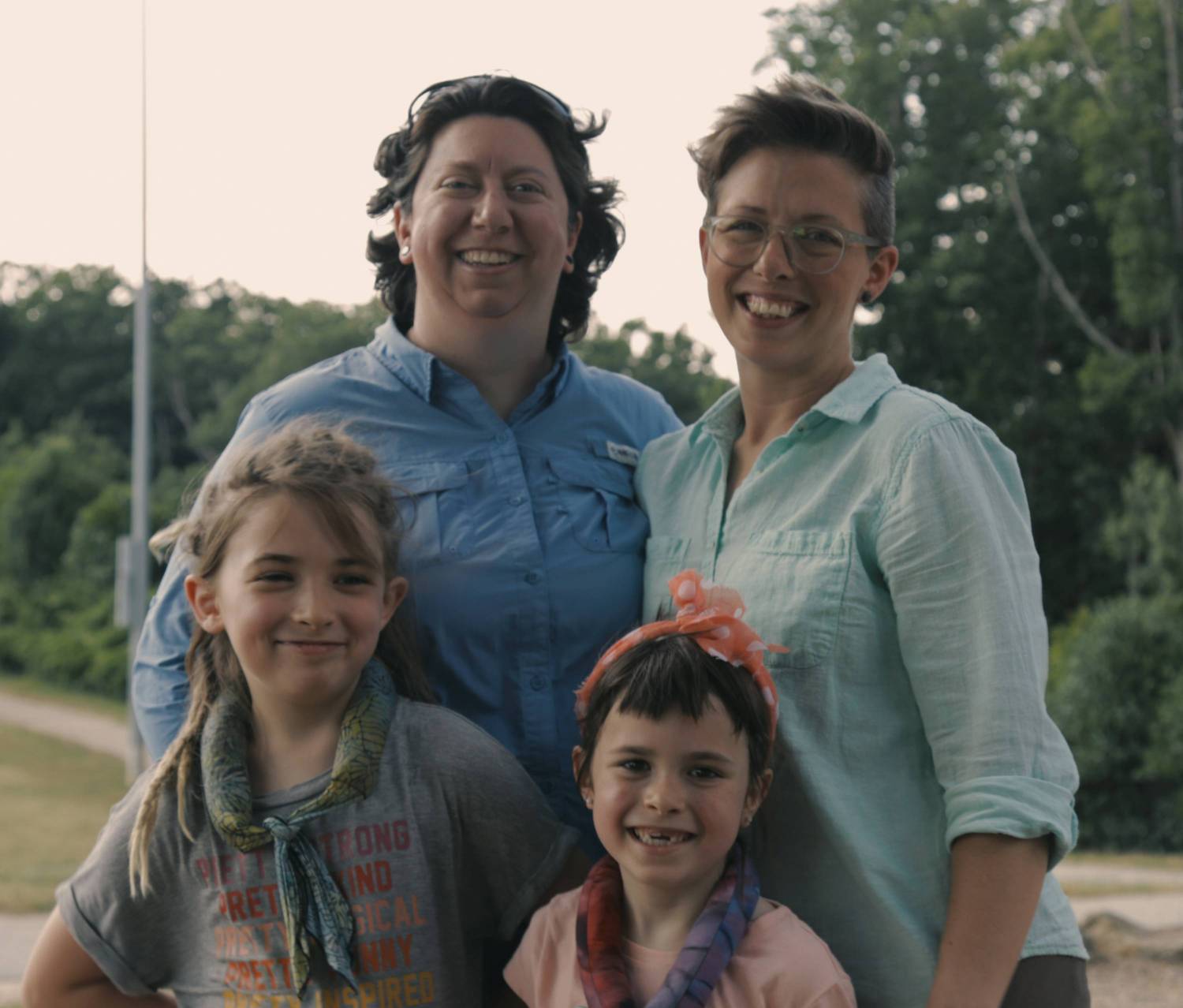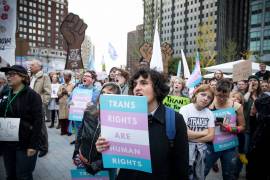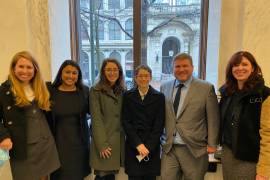Lambda Legal, the ACLU, ACLU of South Carolina, and South Carolina Equality Coalition are suing the U.S. Department of Health and Human Services (HHS) and the state of South Carolina on behalf of a married lesbian couple, Eden Rogers and Brandy Welch, who were turned away by a government-funded foster care agency for failing to meet the agency’s religious criteria, which exclude prospective foster parents who are not evangelical Protestant Christian or who are same-sex couples of any faith.
Eden and Brandy’s application to serve as foster parents was denied by Miracle Hill Ministries, South Carolina’s largest state-contracted foster care agency, after South Carolina requested and HHS granted a waiver of federal nondiscrimination rules for federally funded agencies. In so doing, HHS and the State authorized and enabled taxpayer-funded foster care agencies to use religious criteria to exclude families based on their faith and sexual orientation.
“We work hard to raise our own two girls in a loving and stable home. Faith is a part of our family life, so it is hurtful and insulting to us that Miracle Hill’s religious view of what a family must look like deprives foster children of a nurturing, supportive home,” said Brandy Welch. Brandy, 40, who works in an accounting firm as a cost engineer, and her wife of three years, Eden Rogers, 33, an educator, are the parents of two daughters, ages 7 and 10, and they want to open their home to foster children in part because of Eden’s own family experiences.
“After family challenges, I helped raise my siblings. I know firsthand the fear and stress that children feel when they are forced to leave their homes,” Eden said. “As a mother and an educator, I want to make sure children in foster care have a safe, supportive, and loving home when they need one.”
HHS and South Carolina fund Miracle Hill with taxpayer money to perform child welfare services for children in state care even though Miracle Hill made clear that it excludes families based on Miracle Hill’s religious beliefs. In order to foster through Miracle Hill, a family must agree with Miracle Hill’s “doctrinal statement,” including “that God’s design for marriage is the legal joining of one man and one woman in a life-long covenant relationship” – a requirement that excludes same-sex couples of any faith. HHS and South Carolina have sanctioned and facilitated the use of these religious criteria in the public child welfare system.
“Trump’s HHS and South Carolina should not be permitting foster care agencies that receive taxpayer money to care for wards of the State to disqualify potential foster parents because they don’t conform to a religious litmus test. Agencies have no right to exclude families because of their faith or sexual orientation. Think of all the potential loving and stable families excluded and the message that sends to youth in state care,” said Currey Cook, Counsel and Director of Youth in Out-Of-Home Care Project at Lambda Legal. “By allowing Miracle Hill to discriminate against this couple, the government is not only favoring certain religious beliefs over others, but is also placing those beliefs above what is in the best interest of children in foster care.”
“The state of South Carolina and the Trump Administration have turned their backs on the children of South Carolina who are in foster care. The 4,600 children in state care — many of whom live in group homes, are separated from siblings, or age out of foster care without ever becoming part of a family — need every qualified family that is willing to open their heart and home to a child,” said Susan Dunn, Legal Director of the ACLU of South Carolina. “By allowing discrimination in the state child welfare system, caring, qualified families like Eden and Brandy are turned away. Prospective foster and adoptive parents should be judged only on their capacity to provide love and support to a child. Our state’s priorities should be finding homes for every child who needs one, not providing taxpayer-funded agencies with a license to discriminate.”
“There is simply no place for discrimination in our state’s foster care system,” said Jeff Ayers, Executive Director of South Carolina Equality. “South Carolina’s vulnerable children need loving families ready to give them loving homes. LGBTQ individuals and same-sex couples across South Carolina are those families, ready and able to provide those homes, and they should never be turned away just because they do not meet a foster care agency’s religious standards.”
Lambda Legal, ACLU, and South Carolina Equality Coalition filed the lawsuit today in U.S. District Court for the District of South Carolina on behalf of Eden and Brandy. The lawsuit claims that HHS, the HHS Administration for Children and Families, certain HHS officials, South Carolina Governor Henry McMaster, and the Director of the South Carolina Department of Social Services are violating the Establishment, Equal Protection and Due Process Clauses of the U.S Constitution by authorizing and enabling the use of religious criteria by Miracle Hill to screen out would-be foster families because of their faith or sexual orientation.
Background
In 2018, the South Carolina Department of Social Services (DSS) determined that Miracle Hill Ministries, South Carolina’s largest foster care agency, had violated federal and state nondiscrimination policies by using religious eligibility criteria when screening prospective foster parents. Instead of enforcing the law, South Carolina Governor Henry McMaster sought a waiver from a federal rule that prohibits discrimination by recipients of federal funding to allow the agency to continue to use its discriminatory religious criteria. In November 2018, Lambda Legal, the ACLU and 75 national and state civil rights, child welfare, and faith organizations submitted a letter to HHS Secretary Alex Azar urging him not to grant South Carolina’s request for an exemption from federal nondiscrimination law for faith-based, government-funded child welfare providers and pointing out the potential negative impact on LGBT people. But in January 2019, HHS granted McMaster’s request. The waiver and South Carolina’s subsequent licensing of Miracle Hill have authorized and enabled this taxpayer-funded state-contracted agency to assess and screen out prospective foster parents based on religious requirements that ban all prospective parents who are same-sex couples of any faith or not evangelical Protestants.
In April, Eden and Brandy submitted an online application to Miracle Hill to be foster parents and identified themselves as a same-sex couple and members of their Unitarian Universalist Church, and indicated their desire to “provide a safe and loving environment” for children. On May 1, 2019, a Miracle Hill foster care licensing supervisor sent Eden and Brandy an email rejecting their application because they “feel a religious obligation to partner with foster parents who share our beliefs and who are active in a Christian church” adding that Miracle Hill “would not be a good fit to assist you in your quest . . . to become foster parents.” Eden and Brandy were turned away by Miracle Hill because of their faith and the fact that they are a same-sex couple.
The attorneys working on the case are Currey Cook, Karen Loewy, and Law Fellow Cathren Cohen from Lambda Legal; Leslie Cooper and Daniel Mach from the ACLU; Susan Dunn from ACLU of South Carolina; Peter T. Barbur and Katherine Janson from Cravath, Swaine & Moore LLP, and M. Malissa Burnette and Nekki Shutt from Burnette Shutt & McDaniel on behalf of South Carolina Equality Coalition.





